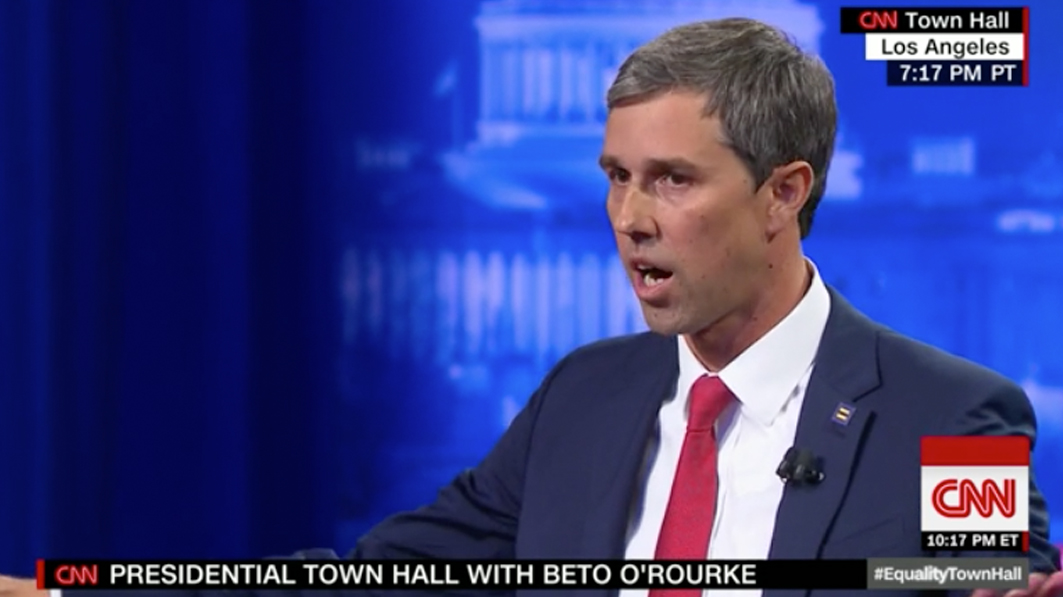Presidential candidate Beto O’Rourke stoked the flames of religious bigotry last Thursday at the CNN Town Hall concerning LGBT issues when he responded to a question from CNN anchor Don Lemon:
“Do you think religious institutions—like colleges, churches, charities—should they lose their tax-exempt status if they oppose same-sex marriage?” asked Lemon.
“Yes,” O’Rourke responded. “There can be no reward, no benefit, no tax break for anyone or any institution, any organization in America, that denies the full human rights and the full civil rights of every single one of us. So as President, we’re going to make that a priority, and we are going to stop those who are infringing upon the human rights of our fellow Americans.”
Political campaigns usually produce outlandish promises in abundance, but this was especially troublesome because it targeted religious Americans.
Several questions ran through my head as I contemplated O’Rourke’s response to Lemon.
First, is it politically feasible? That is to say, could that actually happen?
Yes and no. To accomplish what he wants, it would require legislation amending the tax code that passes both houses of Congress and is signed by a supportive President. It’s always possible to get enough politicians in Congress and the White House who actually believe such a thing would be a public good and have the votes to accomplish it. But those politicians, by and large, attend churches, serve on charitable organization boards, and get voted into office by millions of people who also do those things. And there’s no evidence that any substantial number of voters agree with O’Rourke’s view, even if they support the concept of same-sex marriage. Even talking about taking such action would be political suicide for almost any politician at this moment in history. But tomorrow? Who knows?
Could the IRS avoid Congress and enact its own policy? It successfully accomplished as much in the Bob Jones University case regarding racially discriminatory actions that school followed in the 1960s and 70s.
In the absence of widespread public and congressional support for the issue, however, you’d likely witness another Lois Lerner-type political scandal, which was eventually reversed as soon as cooler heads prevailed.
My next question, then: Is it constitutional?
Probably not. The way O’Rourke phrased his answer, any church whose pastor preaches in favor of God’s design for marriage, or puts it on the church website, or refuses to perform a same-sex wedding, would cause the church to lose its tax-exempt status. Same thing for any faith-based, charitable organization.
Once the government gets into the business of dictating what you must believe in order to receive a government benefit, the Republic is pretty much over.
Such a law wouldn’t survive the scrutiny of a high school civics class, let alone the U.S. Supreme Court.
For now.
The Founding Fathers would be up in arms at the very thought of what O’Rourke is suggesting. Thomas Jefferson, for example, was adamant on this point: “That the opinions of men are not the object of civil government, nor under its jurisdiction; that to suffer the civil magistrate to intrude his powers into the field of opinion to restrain the profession or propagation of principles on supposition of their ill tendency is a dangerous fallacy, which at once destroys all religious liberty.”
That’s not to say that a charitable organization has a constitutional right to a tax-exemption. The tax code, and the section that governs charitable organizations, is part of the federal statutory code, not the Constitution or Bill of Rights. That means that what Congress has given, Congress can take away. As it so happens, granting tax exemptions to charitable organizations serves a function that both meets a public need and keeps the government out of the business of interfering with religion, which is an important goal of the First Amendment’s religion clause.
My final question: Is Justice Samuel Alito right now telling someone “I told you so?”
Remember Justice Alito’s famous “moment” with the Solicitor General of the United States, Donald Verrilli Jr., a President Obama appointee, during the 2015 oral arguments in the Obergefell case that gave us a constitutional “right” to same-sex marriage?
Justice Alito: “Well, in the Bob Jones case, the court held that a college was not entitled to tax-exempt status if it opposed interracial marriage or interracial dating. So would the same apply to a university or college if it opposed same-sex marriage?”
General Verrilli: “You know, I don’t think I can answer that question without knowing more specifics, but it’s certainly going to be an issue. I don’t deny that. I don’t deny that, Justice Alito. It is – it is going to be an issue.”
And four short years later, a candidate for President is calling for that very thing. Alito was prescient. When hypotheticals become real life in that brief period of time, you can only do two things.
Pray. And vote.
Focus on the Family and The Daily Citizen advocates neither the election nor defeat of candidates for office. The Daily Citizen merely reports what they say regarding issues which affect families.
Photo from CNN Live Stream






